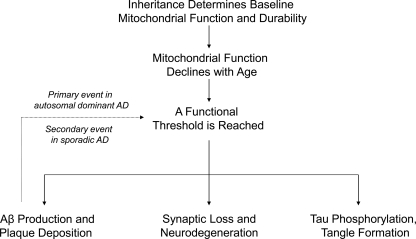FIG. 7.
The sporadic Alzheimer's disease mitochondrial cascade hypothesis. The mitochondrial cascade hypothesis postulates inheritance determines an individual's baseline mitochondrial function and durability. Both parents influence these parameters, but because mtDNA is maternally inherited, mothers have a bigger impact. The functional baseline determines the reserve bioenergetic capacity, while durability determines the rate at which an age-related decline in mitochondrial physiology occurs. When a functional threshold is reached, AD-associated histology changes such as Aβ deposition, tangle formation, and synaptic degradation follow. In the mitochondrial cascade hypothesis, Aβ oligomers, which have been shown to interfere with mitochondrial function in AD models, may contribute to the cascade but do not initiate it. This distinguishes the mitochondrial cascade hypothesis from the amyloid cascade hypothesis, which proposes Aβ oligomerization constitutes the most upstream event and initiates a neurodegenerative cascade.

